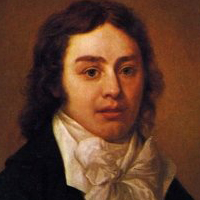Frost at Midnight by Samuel Taylor Coleridge: Analysis
The poem Frost at Midnight written by Coleridge is one of the finest short poems in the English language. It is much loved and much praised. The poem has been set in a very quiet and peaceful atmosphere. It is the time of midnight and the frost is fulfilling its work secretly and unhelped by the wind. The poet reflects upon the absolute stillness of the night broken only by the owlet's cry.

S. T. Coleridge (1772-1834)
It is so quiet that:
"it disturbs And vexes meditation with its strange And extreme silentness,"
All the inmates of the cottage are sleeping and the poet has been left to that solitude. This silent atmosphere makes the poet reflective and meditative, and he is led to discover the affinity between himself and the film fluttering on the grate. There is a feeling of sympathy between the poet and this film because both are awake and active. The idle spirit of the poet interprets the irregular movements of the film according to his own moods and whims, so that the film on the grate becomes an echo of the poet's mind. The peacefulness of the atmosphere and the gentle and subdued thinking of the poet are maintained throughout the poem. Not a single violent thought occurs to disturb the harmony of the poet's mind.
The stillness of the night makes the poet meditative, and his thoughts go back to the past and he remembers his birth-place, the old church and the sweet sound of its bells which was the only music for the poor People. He also recollects his school-days when the "fluttering stranger” (i. e. the fluttering film) had made him hopeful of the arrival of some friend or relative. On such occasions in the morning he used to go and sit in his class-room with his eyes on his book, but his attention was diverted to the expected arrival of some chance-visitor from home. A very similar description of Coleridge's stay at school has been given by his friend, Charles Lamb, in the essay Christ's Hospital, Five and Thirty Years Ago. The autobiographical touch in the poem adds to its interest and appeal.
Coleridge's poetry is rich in sensuous beauty, containing sometimes a mystical radiance, which is the chief quality of Words-worth's poetry. In his descriptions of natural scenes we find a vividness and an accuracy of detail which show that the poet has the power of entering its spirit and reproduce it with a few deft strokes. In Frost at Midnight he expresses his belief that God is present in all the objects of Nature and that His voice is articulate in the various sounds of Nature. He also hopes that his son will live in constant company of Nature and will learn the language of God.
In Coleridge's poetry we find many beautiful descriptions of natural scene He was keenly alive to the beauties of Nature and his highly sensitive soul vibrated in response to the soft and sweet charm of soon and smell. He saw and felt the beauties of nature and was fascinated by them. The poem Frost at night also shows Coleridge's pictorial quality. In the first part of the poem he describes very vividly the frost, owlet's cry, the thin blue flame which does not quiver, and the film, which flutters on the grate, 'the sole unquiet thing.' In the last stanza of the poem the pictures of the earth covered with greenness; the redbreast sitting and singing betwixt the tufts of snow on the bare branch of a mossy apple-tree, and the silent icicles quietly shining to the quiet moon-are very vivid and show the poet's minute observation of natural phenomenon.
The poem is written in charming blank verse and contains many very fine descriptive passages. In this poem Coleridge's attitude towards nature shows a distinct impact of Wordsworth. He, like Wordsworth, finds nature sympathetic to the man,- as the thin blue flame that flutters in the grate has dim sympathies with him. He wishes for his son Hartley (as Wordsworth wished for his sister Dorothy) to develop intimate and living contact with nature that wields great power over human life. Nature is the greatest teacher to man. He wants nature, the universal teacher to mold and shape the spirit of his son. Coleridge here expresses the Vedantic philosophy that God is present everywhere and in all the objects of this world. The beautiful sights and sounds of nature are representations of God who speaks to us through them and it is for us to pay attention to them and understand their meaning and significance. The poem shows so much of Wordsworth's influence on Coleridge that one critic goes to the extent of saying that "its closing lines might have flowed straight from the pen of Wordsworth himself."
Cite this Page!
Shrestha, Roma. "Frost at Midnight by Samuel Taylor Coleridge: Analysis." BachelorandMaster, 2 Nov. 2017, bachelorandmaster.com/britishandamericanpoetry/frost-at-midnight-analysis.html.
Related Topics
Kubla Khan: Summary and Analysis
The Rime of the Ancient Mariner: Summary & Analysis
Christabel: Summary and Analysis
Biography of Samuel Taylor Coleridge
 |
bachelorandmaster.com |